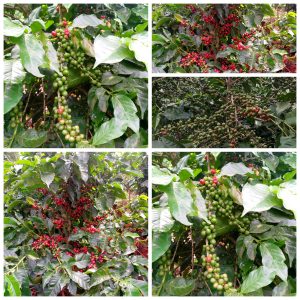Coffee Production Per Tree In Kenya?Well, On average, a mature coffee tree in Kenya can yield between 2 to 4 kilograms of coffee cherries per year.
The average coffee production per tree in Kenya can vary depending on various factors such as the age of the tree, coffee variety, growing conditions, farming practices, and management techniques.
Coffee production is an integral part of Kenya’s agricultural industry. With its favorable climate and rich soils, Kenya has become renowned for producing high-quality coffee beans.
In this comprehensive guide, we will delve into the intricacies of coffee production per tree in Kenya. From cultivation techniques to yield optimization strategies, we will explore the factors that contribute to Kenya’s success in the coffee industry.
Factors Affecting Coffee Production Per Tree in Kenya: An Overview
Coffee trees in Kenya are typically of the Arabica variety, which is known for its exceptional quality. The country’s coffee production is concentrated in the highlands, where altitudes ranging from 1,500 to 2,000 meters above sea level provide the perfect conditions for optimal growth. The average coffee tree in Kenya yields approximately 2 kilograms of cherries per year.
1.Altitude and Climate
The altitude at which coffee is grown plays a crucial role in determining its quality and yield. In Kenya, the high-altitude regions provide the ideal conditions for coffee cultivation.
The cool temperatures and abundant rainfall in these areas contribute to slow cherry maturation and the development of complex flavors in the beans.
2.Soil Quality
The fertility of the soil is another critical factor that affects coffee production. Kenya’s volcanic soils, rich in minerals and organic matter, create an optimal environment for coffee trees to thrive. The well-drained nature of these soils also helps prevent waterlogging, which can be detrimental to the health of the trees.
3.Cultivation Techniques
Kenyan coffee farmers employ various cultivation techniques to maximize the production per tree. One widely adopted method is the use of shade trees, which provide protection from excessive sunlight and help regulate the temperature. This technique promotes the slow and steady development of cherries, resulting in higher-quality beans.
4.Pruning and Maintenance
Regular pruning is essential to ensure the health and productivity of coffee trees. Pruning helps remove dead or diseased branches, improves air circulation, and allows for better sunlight penetration. Additionally, proper maintenance practices such as fertilization and irrigation play a crucial role in optimizing coffee production per tree.
5.Disease and Pest Management
Coffee trees are susceptible to various diseases and pests that can significantly impact yield. In Kenya, farmers employ integrated pest management strategies to combat these challenges.
This approach involves a combination of cultural, biological, and chemical control methods to minimize the use of pesticides while effectively managing pests and diseases.
Coffee Production Per Tree in Kenya: Frequently Asked Questions (FAQs)
-
Q: How long does it take for a coffee tree in Kenya to start producing cherries?
A: Coffee trees typically take about three to four years to start producing cherries after planting.
-
Q: What is the peak coffee harvesting season in Kenya?
A: The peak coffee harvesting season in Kenya usually occurs between October and December.
-
Q: How are coffee cherries processed in Kenya?
A: In Kenya, coffee cherries are primarily processed using the wet processing method, which involves removing the pulp and fermenting the beans before drying them.
-
Q: What is the significance of the Coffee Auction in Kenya?
A: The Coffee Auction in Kenya is a crucial platform where buyers and sellers meet to trade coffee. It ensures transparency and fair pricing, contributing to the reputation of Kenyan coffee globally.
-
Q: What are some common coffee diseases in Kenya and how are they managed?
A: Common coffee diseases in Kenya include Coffee Berry Disease and Coffee Leaf Rust. Farmers employ disease management strategies such as regular monitoring, timely pruning, and the use of resistant coffee varieties to mitigate the impact of these diseases.
-
Q: Are there any sustainable practices adopted in coffee production in Kenya?
A: Yes, sustainable practices are becoming increasingly important in the coffee industry. Kenyan coffee farmers are implementing practices such as organic farming, water conservation, and promoting biodiversity to ensure the long-term viability of coffee production while preserving the environment.
Conclusion
In conclusion, coffee production per tree in Kenya is influenced by various factors, including altitude, climate, soil quality, cultivation techniques, pruning, and disease management. The unique combination of these elements contributes to Kenya’s reputation for producing exceptional coffee beans.
By implementing sustainable practices and adopting effective cultivation methods, Kenyan coffee farmers continue to optimize yields while maintaining the high quality that the country is known for.
As a coffee lover, exploring the world of coffee production in Kenya offers a fascinating glimpse into the intricate processes involved in bringing a cup of coffee to our tables. From the meticulous care given to each coffee tree to the precise harvesting and processing methods, every step contributes to the distinct flavors and aromas that make Kenyan coffee so sought after.
So, the next time you enjoy a cup of coffee, take a moment to appreciate the journey it has undertaken, from the lush coffee farms of Kenya to your mug. The story behind each sip adds a layer of richness to the experience and further deepens our connection with this beloved beverage.
Recent Posts
The President of the United States exercised his war powers this weekend by ordering a major military strike against Iran without formal authorization from Congress, escalating a longstanding...
Trump Bypasses Congress on Iran Strike, Prompting Fierce War Powers Vote Demands in Washington
Washington D.C., March 1, 2026 — A major constitutional and political crisis unfolded in the U.S. capital today after President Donald Trump authorized a large‑scale military strike against Iran...